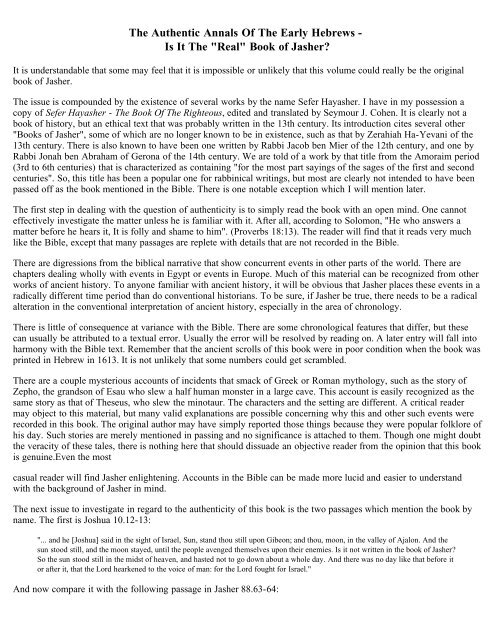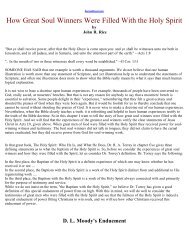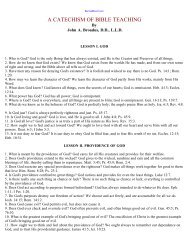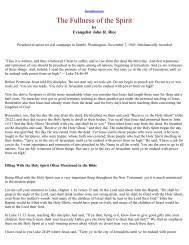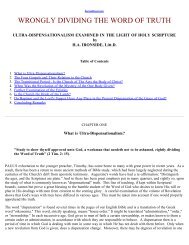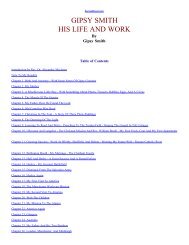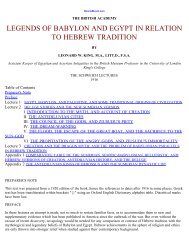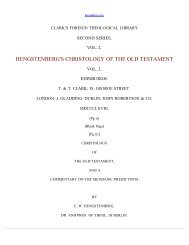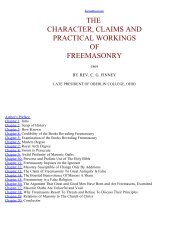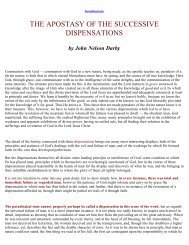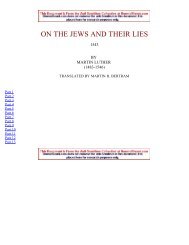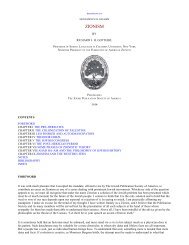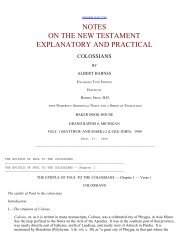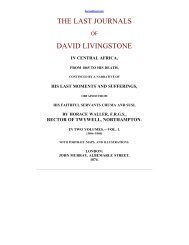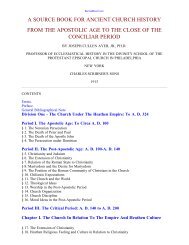The Book of Jasher.pdf - Bennie Blount.com
The Book of Jasher.pdf - Bennie Blount.com
The Book of Jasher.pdf - Bennie Blount.com
You also want an ePaper? Increase the reach of your titles
YUMPU automatically turns print PDFs into web optimized ePapers that Google loves.
<strong>The</strong> Authentic Annals Of <strong>The</strong> Early Hebrews -<br />
Is It <strong>The</strong> "Real" <strong>Book</strong> <strong>of</strong> <strong>Jasher</strong>?<br />
It is understandable that some may feel that it is impossible or unlikely that this volume could really be the original<br />
book <strong>of</strong> <strong>Jasher</strong>.<br />
<strong>The</strong> issue is <strong>com</strong>pounded by the existence <strong>of</strong> several works by the name Sefer Hayasher. I have in my possession a<br />
copy <strong>of</strong> Sefer Hayasher - <strong>The</strong> <strong>Book</strong> Of <strong>The</strong> Righteous, edited and translated by Seymour J. Cohen. It is clearly not a<br />
book <strong>of</strong> history, but an ethical text that was probably written in the 13th century. Its introduction cites several other<br />
"<strong>Book</strong>s <strong>of</strong> <strong>Jasher</strong>", some <strong>of</strong> which are no longer known to be in existence, such as that by Zerahiah Ha-Yevani <strong>of</strong> the<br />
13th century. <strong>The</strong>re is also known to have been one written by Rabbi Jacob ben Mier <strong>of</strong> the 12th century, and one by<br />
Rabbi Jonah ben Abraham <strong>of</strong> Gerona <strong>of</strong> the 14th century. We are told <strong>of</strong> a work by that title from the Amoraim period<br />
(3rd to 6th centuries) that is characterized as containing "for the most part sayings <strong>of</strong> the sages <strong>of</strong> the first and second<br />
centuries". So, this title has been a popular one for rabbinical writings, but most are clearly not intended to have been<br />
passed <strong>of</strong>f as the book mentioned in the Bible. <strong>The</strong>re is one notable exception which I will mention later.<br />
<strong>The</strong> first step in dealing with the question <strong>of</strong> authenticity is to simply read the book with an open mind. One cannot<br />
effectively investigate the matter unless he is familiar with it. After all, according to Solomon, "He who answers a<br />
matter before he hears it, It is folly and shame to him". (Proverbs 18:13). <strong>The</strong> reader will find that it reads very much<br />
like the Bible, except that many passages are replete with details that are not recorded in the Bible.<br />
<strong>The</strong>re are digressions from the biblical narrative that show concurrent events in other parts <strong>of</strong> the world. <strong>The</strong>re are<br />
chapters dealing wholly with events in Egypt or events in Europe. Much <strong>of</strong> this material can be recognized from other<br />
works <strong>of</strong> ancient history. To anyone familiar with ancient history, it will be obvious that <strong>Jasher</strong> places these events in a<br />
radically different time period than do conventional historians. To be sure, if <strong>Jasher</strong> be true, there needs to be a radical<br />
alteration in the conventional interpretation <strong>of</strong> ancient history, especially in the area <strong>of</strong> chronology.<br />
<strong>The</strong>re is little <strong>of</strong> consequence at variance with the Bible. <strong>The</strong>re are some chronological features that differ, but these<br />
can usually be attributed to a textual error. Usually the error will be resolved by reading on. A later entry will fall into<br />
harmony with the Bible text. Remember that the ancient scrolls <strong>of</strong> this book were in poor condition when the book was<br />
printed in Hebrew in 1613. It is not unlikely that some numbers could get scrambled.<br />
<strong>The</strong>re are a couple mysterious accounts <strong>of</strong> incidents that smack <strong>of</strong> Greek or Roman mythology, such as the story <strong>of</strong><br />
Zepho, the grandson <strong>of</strong> Esau who slew a half human monster in a large cave. This account is easily recognized as the<br />
same story as that <strong>of</strong> <strong>The</strong>seus, who slew the minotaur. <strong>The</strong> characters and the setting are different. A critical reader<br />
may object to this material, but many valid explanations are possible concerning why this and other such events were<br />
recorded in this book. <strong>The</strong> original author may have simply reported those things because they were popular folklore <strong>of</strong><br />
his day. Such stories are merely mentioned in passing and no significance is attached to them. Though one might doubt<br />
the veracity <strong>of</strong> these tales, there is nothing here that should dissuade an objective reader from the opinion that this book<br />
is genuine.Even the most<br />
casual reader will find <strong>Jasher</strong> enlightening. Accounts in the Bible can be made more lucid and easier to understand<br />
with the background <strong>of</strong> <strong>Jasher</strong> in mind.<br />
<strong>The</strong> next issue to investigate in regard to the authenticity <strong>of</strong> this book is the two passages which mention the book by<br />
name. <strong>The</strong> first is Joshua 10.12-13:<br />
"... and he [Joshua] said in the sight <strong>of</strong> Israel, Sun, stand thou still upon Gibeon; and thou, moon, in the valley <strong>of</strong> Ajalon. And the<br />
sun stood still, and the moon stayed, until the people avenged themselves upon their enemies. Is it not written in the book <strong>of</strong> <strong>Jasher</strong>?<br />
So the sun stood still in the midst <strong>of</strong> heaven, and hasted not to go down about a whole day. And there was no day like that before it<br />
or after it, that the Lord hearkened to the voice <strong>of</strong> man: for the Lord fought for Israel."<br />
And now <strong>com</strong>pare it with the following passage in <strong>Jasher</strong> 88.63-64:


